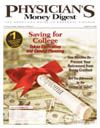Publication
Article
Physician's Money Digest
Start Tax Planning Earlier to Save More in April
Author(s):
When you examine where all your hard-earnedmoney goes, it doesn't take long todiscover that income taxes take a largebite out of your wallet. Yet most people will beginlooking at their taxes shortly before April 2007 forthe 2006 tax year. This is way too late to do much toreduce your tax bite. It is important to begin your taxplanning in November and December each year. Thefollowing key areas should be considered:
•Accelerate expenses and postpone income.If you own your own medical practice, consider theadvantages of accelerating expenses and postponingincome to the extent possible. In a medical practice itis easy to stock up on supplies that will be needednext year. Postponing income can be more challenging,but it is still possible. If you are an associate in apractice, for example, the medical practice ownermay be willing to pay you your 2006 bonus inJanuary 2007, allowing you to postpone the tax onthat income.
•Establish a retirement plan. If you own yourpractice, consider whether it is worthwhile to set upa retirement plan for you and your employees.Depending on the size of your payroll and number ofeligible employees, a retirement plan could be beneficialto you, or it could create a net expense. There area number of options available to you, including a401(k) plan, profit sharing plan, defined benefit plan,etc. Meet with your financial or tax advisor to discusswhich is best for your practice.
•Postpone mutual fund investing. Mutualfunds are required by law to pay out all interest, dividends,and capital gains by the end of each calendaryear. This often results in the shareholders receivingtaxable income on a fund they just invested in.Postpone any new investments until January so youcan delay that expense.
•Match your gains and losses. Review yourpersonal investments and determine if your tradingactivity during 2006 has resulted in net realized gainsor losses. Next, review your portfolio to determine ifyou can sell securities to reduce your taxes. Forexample, if your activity during the year has resultedin a $4000 short-term gain, identify securities thathave a $4000 loss. Sell them to realize the loss andeffectively eliminate the taxes. If you like the securityyou just sold, wait 31 days and buy it back.Remember that net realized losses may be used tooffset up to $3000 of ordinary income.
•Give to charities. Donations to charities mustbe done by December 31 in order to get the taxdeduction for that year. If you charge your donationthis year but pay your credit card in January, you canstill take the charitable deduction this year. Highlyappreciated stocks are often a better donation thancash, since it allows you to "give away" the tax problemas well.
It is important to have a tax strategy meeting withyour financial planner or tax advisor before year-end.They are trained to identify a complete range of possibleopportunities.
Stewart H.Welch III, CFP®, AEP, is the founder of the Welch Group,LLC, which specializes in providing fee-only wealth managementservices to affluent retirees and health care professionals throughoutthe United States. He is the coauthor of J.K. Lasser's New Rulesfor Estate and Tax Planning (John Wiley & Sons, Inc; 2001). He welcomesquestions or comments at 800-709-7100 or visit www.welchgroup.com.This article was reprinted with permission from the Birmingham Post Herald. Hethanks his partner Scott Lee for his assistance with this article.
